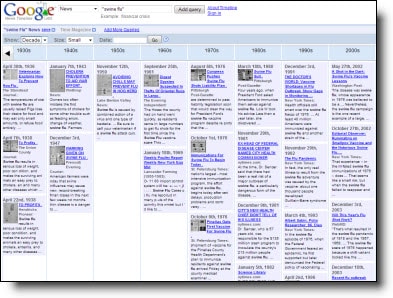Victims of swine flu and their families will doubtless disagree, but the current web-based panic over this disease is something of a nonsense. True enough, flu can be a debilitating and sometimes fatal disease – but that has always been the case. The current brouhaha would make you think, however, that millions of us are about to drop down dead.

The truth of the matter, however, can easily be examined using a new tool recently introduced by Google. Their “News Timeline” shows us that the first reported case of swine flu in humans was in 1961.The News Timeline is an experimental feature from Google which looks at news coverage back over several hundred years using scanned images of newspapers and magazines as well as a host of other news sources. You can look at the news for a day, a week, a month, a year or a decade – and you scan scroll through each of these different categories. As a research tool it is already proving highly valuable.
For Swine Flu it shows us that we have been living with it for decades. Indeed, many people who have suffered “the flu” may well have been sufferring from swine flu without ever realising it. The fact of the matter is – even in times of pandemics – most people who get the flu get over it fairly quickly. If you are worried, though, see Flu Facts.
Our memories are pretty poor at recalling things that are not that important to us personally. The people who remember the last flu pandemic (back in 1968) will be those who were most affected by it. Those of us who were alive at the time and had no real contact with “Hong Kong Flu” as it was known then, will probably remember it vaguely, if at all. Our brains had no real reason to help us remember it.
We seem to remember “episodes” that affect ourselves – our own life stories – better than more random things, such as news items or historical events. Indeed, research amongst witnesses in crime cases show they are notoriously bad at remembering the details in any accurate way; they think they have recalled things accurately – but frequently have not and are somewhat deluding themselves that their truth is the actual truth.
Similar things are happening now online. Twitter is awash with people saying how bad it was in the last flu pandemics and there are soothsayers telling us we’re all doomed. But their memories for what actually happened in previous flu outbreaks can be inaccurate.
That’s why a tool like Google News Timeline is so valuable. It can help us trawl through some records of the past to help us get a better perspective on things and correct any memory errors we may have. For instance, if your business is about to pitch for some new business, simply recalling what your prospective client has achieved could mean you miss out on some significant events in their history. Your brain is not as accurate as you think. Hence a quick trawl through Google News Timeline would mean you are better informed and therefore more able to win that new contract.
True, you could have achieved much of what Google News Timeline does with several web tools – such as Google News itself, Wikipedia and various online magazine and newspaper libraries. But the time it would have taken you could be counterproductive. Now, with Google News Timeline it takes seconds and is therefore another useful item in your online toolkit.

